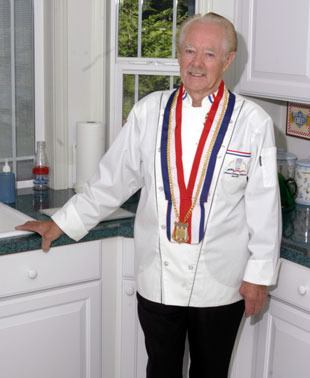TULALIP — Unlike the Beatles, Jim Douglas did not receive a riotous welcome when he arrived in the United States in 1964.
But that hasn’t stopped the Liverpool, England, native from making a mark in his own area of expertise — cooking.
Douglas, 78, who now lives in Tulalip, has spent more than 60 years in the kitchen in varying capacities, ranging from apprentice cook to executive chef.
The retired chef has headed up the famous 13 Coins and Space Needle restaurants in Seattle, and has taught culinary arts at Everett Community College and at the former Washington State Reformatory, now known as Monroe Correctional Complex state prison.
In August, Douglas was named to The American Academy of Chefs Culinary Hall of Fame — one of the highest honors any chef can attain in the United States.
Douglas was only the second Washingtonian to ever receive the honor. Only 75 individuals have been put on the academy’s hall of fame, which includes honorary inductee Julia Child.
Two or three members of the American Academy of Chefs are taken each year.
“They don’t just give this award to anybody,” said a smiling Douglas, who has served as chairperson for the national academy for a combined 16 years.
The American Academy of Chefs operates under the American Culinary Federation, which offers members extensive certification and training opportunities and has more than 20,000 members.
Approximately 500 members take part in the academy of chefs, Douglas said.
A traveling tale
Douglas’ journey from cooking at Gleneagles Hotel in Aucherader, Scotland, to culinary hall of fame is a unique one.
Douglas originally wanted to join the English Merchant Marines, but soon learned that he had to go to school in order to take part.
He shifted his priorities to cooking, and knew by age 16 that preparing food was what he wanted to do for a career.
After working at various chef positions for a handful of venues in the Liverpool area, Douglas got his first gig in the United States at the Space Needle Restaurant. Although he wanted to work across the pond for financial reasons, he said the weather in the Northwest played a role in his decision.
“My sister and niece sponsored me to come over here,” Douglas said. “I originally wanted to go to California, but I found out that I didn’t like it as much.”
Soon after, his wife, Daureen, followed him across the Atlantic Ocean.
Douglas originally joined the Washington State Chef’s Association in 1972. He quickly began to acquire various certifications, and was named the state chapter president in 1975, 1976 and 1977. He was also vice president in 1978.
Teaching food
Douglas then branched off from working in the kitchen to working with students.
He started teaching culinary arts to prisoners part-time at Monroe in 1974 under an apprenticeship program.
The chef enjoyed it so much that he came on full-time as an instructor.
“(The prisoners) really appreciated it there,” Douglas said. “We even helped find people positions in the kitchen after they got out. They were working with real knives during class and I felt safe.”
Douglas then worked at Everett Community College, serving as an executive chef instructor and director of food service and culinary arts.
“I sort of learned to teach,” he said. “I didn’t have much knowledge of teaching until I started.”
Still keeping busy in the kitchen
Douglas retired in 1997, but still keeps busy with his wife — the chef of the house.
He continues to help prepare for the Washington State Governor’s Inaugural Ball in Olympia. The event feeds more than 6,000 people each year.
Douglas also gives food demonstrations and continues to participate with the state and national chef’s associations.
To this day, he doesn’t fancy himself an expert in any particular style of food. He said he’s prepared dishes from all across the world, including his native England, which unfortunately has a reputation for bland food.
His favorite dishes to prepare are soups, but Douglas added that he loves making sauces as well.
“Soups and sauces are just more intriguing,” Douglas said. “They’re more involved. You have to get the seasoning just right and reduce the viscosity. It’s much different than a roast, for example.”
Since he’s been in the Northwest, the number of seafood dishes he’s prepared has increased.
But it’s the hall of fame induction that’s the topper.
“Once you’ve reached that, there’s not much further you can go,” Douglas said. “That was a ‘Wow’ moment for me. My first ‘Wow’ moment was when I met my wife. When I got married that was another ‘Wow’ moment. I said that this (induction) was the icing on the cake.”



